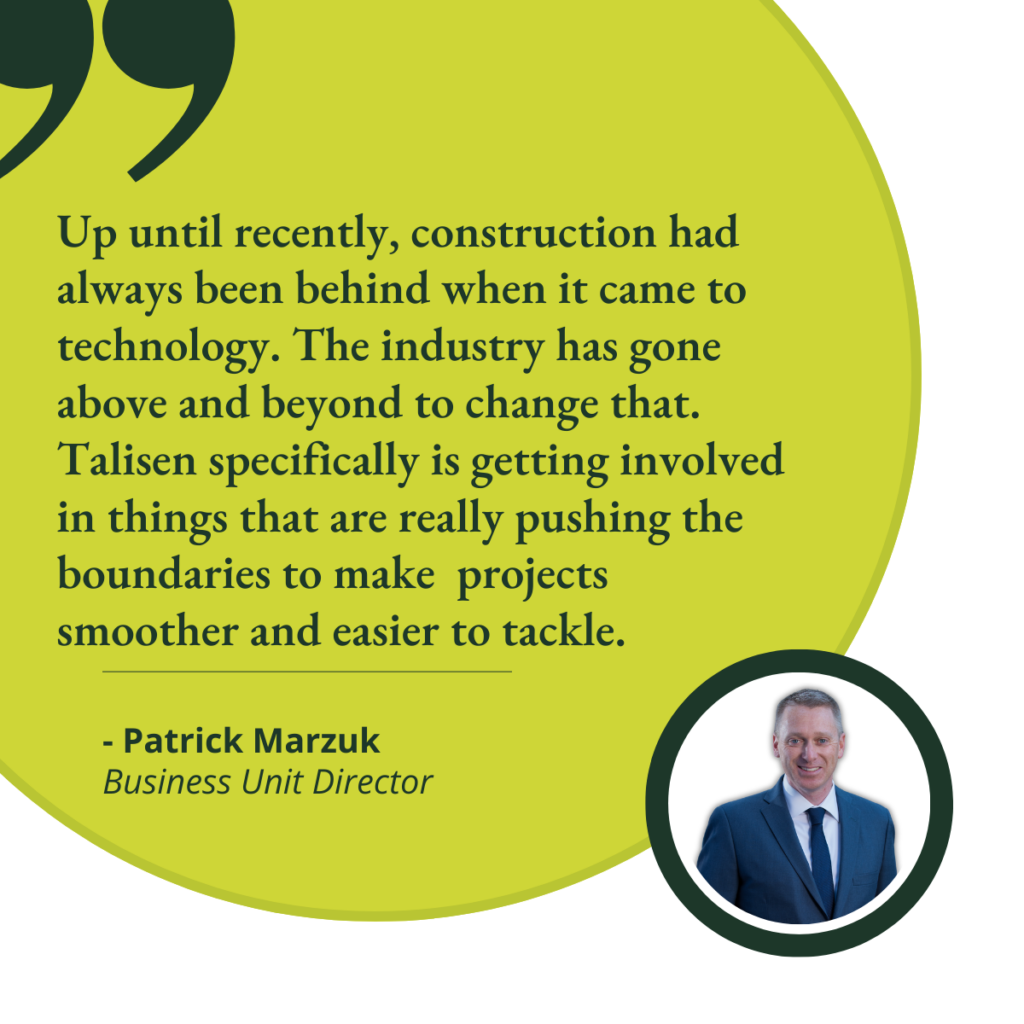Could Gen Z be the next “toolbelt generation”? Some sources say yes, as more young people of working age have been opting for vocational school over college enrollment. From 2019 to 2024, blue-collar employment grew faster for employees in their early 20s than for those aged 25 to 39, according to ADP. However, the percentage of those employees has been stagnant since 2022, suggesting the trend may be reversing or plateauing. Nonetheless, our industry needs new workers, and many believe Generation Z could be just what we’re looking for.
What Makes Construction Attractive to Gen Z?
Those of working age born between 1997 and 2012 are turning to the construction industry for the many benefits it offers, including:
Growth Potential
 Construction offers clear, well-defined pathways for promotions and leadership roles, making it particularly attractive to young professionals seeking long-term career growth. Entry-level positions, such as apprenticeships or assistant roles, can quickly lead to more advanced opportunities as individuals gain experience and certifications. For those with strong organizational and leadership skills, construction management positions offer a clear path to high-level roles. With experience, workers can move from project coordinator or assistant project manager roles into positions like project manager, superintendent, or executive roles such as director or vice president.
Construction offers clear, well-defined pathways for promotions and leadership roles, making it particularly attractive to young professionals seeking long-term career growth. Entry-level positions, such as apprenticeships or assistant roles, can quickly lead to more advanced opportunities as individuals gain experience and certifications. For those with strong organizational and leadership skills, construction management positions offer a clear path to high-level roles. With experience, workers can move from project coordinator or assistant project manager roles into positions like project manager, superintendent, or executive roles such as director or vice president.
Higher Wages
The construction industry consistently offers wages above the national average for many entry-level positions, making it an attractive option for Gen Z professionals seeking financial stability. Employees are valued for their hard work and savvy over a college degree, meaning they can earn excellent pay sooner than their college-going peers while bypassing thousands of dollars in student loan debt. Additionally, wages tend to rise significantly as professionals gain experience and certifications. This earning potential is particularly appealing to Gen Z workers who prioritize financial independence and career growth. Furthermore, the industry’s demand for skilled labor often leads to competitive salary packages, bonuses, and overtime pay, further boosting overall earnings.
Excellent Benefits
Many construction companies offer comprehensive benefits packages beyond competitive wages, making the industry particularly appealing to professionals who value work-life balance and financial security. For example, benefits at Talisen include:
- Healthcare: Full medical, dental, and vision insurance gives employees and their families access to necessary healthcare services and health savings accounts (HSAs).
- Retirement Plans: 401k plans with employer-matching contribution allows employees to build long-term financial security. These plans help young professionals save for the future early in their careers and often outperform those offered in other industries.
- Paid Time Off: Vacation days, holidays, and personal leave ensure workers have time to recharge and maintain a healthy work-life balance. Talisen also supports family life and personal well-being by offering paid sick leave and parental leave.
- Work-Life Balance Programs: Talisen offers flexible work hours or hybrid work options for office-based roles, allowing employees to have better control over their schedules.
High Demand
The construction industry is experiencing an unprecedented level of demand for skilled workers, driven by several factors, such as ongoing infrastructure projects, increasing urban development, green and sustainable building, advancements in technology, and healthcare and educational expansion. For Gen Z professionals, entering the construction industry offers long-term job security and a steady stream of opportunities across various sectors.

Variety of Roles
From the hands-on, physical work of a skilled trade like plumbing or masonry to project management and engineer roles, construction presents many career opportunities that appeal to diverse skills and interests. Lateral movements are also incredibly common, allowing workers to move between the trades or from the field to the office as they determine the roles that best suit them.
Minimal Pay Gap
The construction industry stands out as one of the few sectors with a minimal gender pay gap, offering women almost equal pay to their male colleagues. Women in the construction industry earn 99.1% of what men earn, which is significantly higher than the national average, where women earn just 84% of men’s earnings. This near-pay parity is based on performance, skill level, certifications, and experience– as should be the case in every industry. Additionally, many construction roles are unionized, so pay scales are fixed and standardized across gender lines. The industry has made conscious efforts in recent years to attract and retain more women in the workforce, recognizing the value of diverse perspectives in problem-solving and project execution. Many companies, like Talisen, possess policies and programs that promote gender diversity, equal pay, and career advancement for women.
Education & Training Opportunities
Talisen believes in nurturing the next generation of construction leaders through hands-on experience and professional development. We understand that learning on the job and structured guidance are vital to helping young professionals thrive in this industry, and the rest of the industry shares this belief. That’s why extensive training and hands-on experience is bountiful in construction, allowing those just starting their careers to gain invaluable exposure to real projects and learn from seasoned experts. Certifications, apprenticeships, and continuing education programs allow workers to grow their skills, advance their careers, and achieve as much growth as possible.
Measures of Job Satisfaction
When considering job satisfaction, recent statistics from Construction Today reveal that nearly 86% of Gen Z prioritize a sense of purpose and environmental sustainability. Additionally, according to Adobe’s Future Workforce Study, 70% of Gen Z would leave their current position for a job offering superior technology. Well, according to Talisen Construction, the construction industry we know and love provides everything the next generation could hope for, and here’s how:
-
Purpose

A profession in construction is a viable and fulfilling career choice with vast potential to learn, grow, innovate, and make an impact. Whether putting hammer to nail for a school for children with developmental disabilities or overseeing a brand-new hospital build, working in construction allows individuals to contribute to their community and leave a lasting legacy in the spaces people use and appreciate every day. This sector encompasses a variety of roles both in the field and the office that require technical and creative skills, making it an exciting and purposeful career choice for a broad spectrum of talents. From traditional craftsmanship to modern technology, the industry now thrives on an assortment of expertise in project management, business operations, IT, digital marketing, and more, fostering an inclusive environment that values diverse talents and enables all team members to contribute to and benefit from projects.
Talisen’s approach to construction is a testament to this evolution. As a modern general contracting and construction management firm, our company structure demonstrates the range of roles required to deliver projects successfully. Directors of construction and pre-construction, business unit directors, project managers, assistant project managers, project engineers, field superintendents, and assistant field supers all play critical roles in meeting and exceeding project timelines, budgets, and quality standards. On the office side, we have business development, communications, marketing, accounting, IT operations, and administrative teams working to expand Talisen’s reach, refining our processes, and engaging with the communities we serve.
The wide range of roles within a firm like Talisen presents endless options for young professionals interested in this field. Whether you’re interested in the technical side of project management, the creative aspects of design and marketing, or the problem-solving nature of operations, there’s a pathway for you to explore and grow. At Talisen, young professionals can find opportunities to carve out fulfilling careers in construction while actively contributing to impactful projects that shape New York’s skyline and communities.
2. Technology
 Construction is one of the fastest-growing industries in the United States. As per the US Bureau of Labor Statistics, the $2 trillion sector added an extra 27,000 jobs during June 2024 alone, an increase from its typical monthly addition of 20,000 open roles. The advancement of modern construction technologies has a lot to do with this. As the industry shifts from its traditional image of manual labor into a sector that blends traditional craftsmanship with modern technology, the evolution of construction technologies and the rise of artificial intelligence (AI) are transforming the industry and opening up a diverse range of job opportunities at an accelerated rate.
Construction is one of the fastest-growing industries in the United States. As per the US Bureau of Labor Statistics, the $2 trillion sector added an extra 27,000 jobs during June 2024 alone, an increase from its typical monthly addition of 20,000 open roles. The advancement of modern construction technologies has a lot to do with this. As the industry shifts from its traditional image of manual labor into a sector that blends traditional craftsmanship with modern technology, the evolution of construction technologies and the rise of artificial intelligence (AI) are transforming the industry and opening up a diverse range of job opportunities at an accelerated rate.
Building Information Modeling (BIM), drones, robotics, and AI-driven project management tools are becoming increasingly integrated into construction processes, and new roles are emerging that require both technical expertise and digital fluency. For example, BIM specialists are now in high demand to create detailed 3D models and simulations that optimize project planning and execution. Similarly, drone operators play a vital role in site surveying, while data analysts use AI to streamline logistics, improve safety protocols, and enhance overall project efficiency.

The future of construction lies in leveraging advanced tools that enhance work and attract and retain talented professionals who value innovation. At Talisen, we created our very own cloud-based app that plays a pivotal role in the pre-construction phase of our projects. The app provides vital information such as a subcontractor’s bidding history, preferred geographic areas of work, ideal contract size, union capabilities, and insurance standards to ensure every project is executed with the best team possible.
3. Environmental Sustainability
The construction industry is increasingly prioritizing sustainability and green building practices. Driven by the growing urgency to confront climate change and reduce environmental impact, companies are embracing eco-friendly materials, energy-efficient designs, and sustainable construction methods that meet stringent regulations and respond to heightened public awareness. Technologies like Building Information Modeling (BIM) and smart building systems enable more precise planning and reduced waste, while innovations in renewable energy, carbon-neutral materials, and water conservation are becoming critical components of modern projects. As a result, sustainability is no longer an option but a core focus shaping the future of construction.
At Talisen, we create spaces that benefit our clients, the community, and the environment by incorporating energy-efficient materials and environmentally friendly designs. Our commitment to green building solutions and sustainable construction practices is evident in our work at the Hudson Research Center for HiberCell, which resulted in a LEED-Silver Certified office and laboratory space.
To the Next Generation: A Fulfilling Career Awaits
As our industry continues to modernize, Talisen’s commitment to staying at the forefront means blending traditional construction values with those of the next generation. Talisen Construction is dedicated to empowering new talent to shape the future of the construction sector, believing that by supporting and inspiring young professionals, we can build a better, more innovative future for the entire industry.
To those considering a career in construction, we invite you to explore the diverse and enriching opportunities that await. At Talisen, you will find a place where your skills, ideas, and ambitions are valued and contribute to building something greater that will last for generations. Learn more about our available opportunities and become part of a team that’s building the future together.





